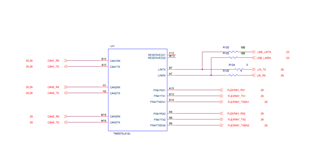Other Parts Discussed in Thread: TMS570LS1227,
Dear TI E2E Team,
I am using evaluation board TMDS570LS12HDK to develop a project with TMS570LS1227 microcontroller, and i have some concerns about pins LINTX/LINRX on connector J11.
In particular, from the electrical schematic contained in spnr035 documentation, pins A7 (LINRX) and B7 (LINTX) of the microcontroller are connected both to the connector J11, through 0R resistors R125 and R124, and to the pins 38 and 39 of FT2232HL chip U27 through 100R resistors R123 and R122.
For my project i have to use microcontroller pins A7 and B7 configured as inputs; has anyone already used J11 pins LINRX and LINTX? Is it possible to drive them without worrying about FT2232HL chip? My external signal generator is capable of sinking or sourcing a current up to 16mA.
Thanks for your attention and collaboration, i wait for your reply.
Best regards
Claudio Paglia


